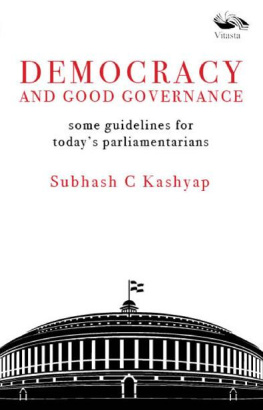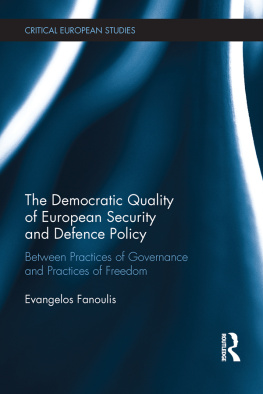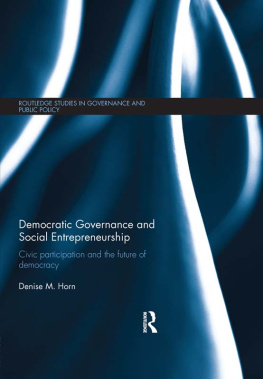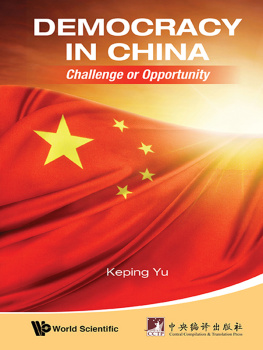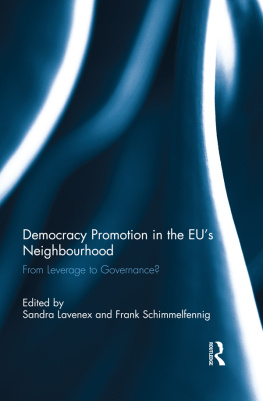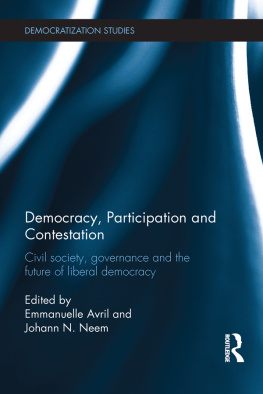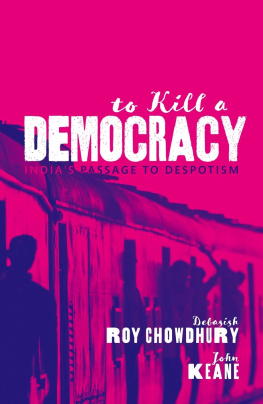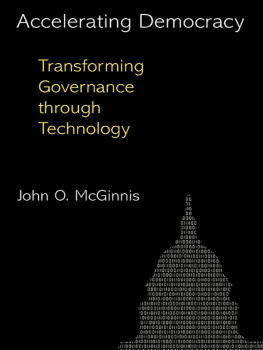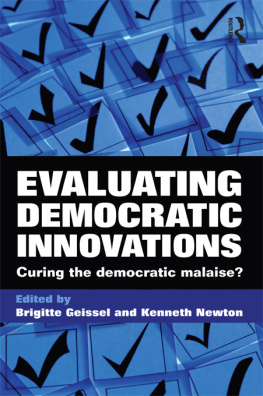DEMOCRACY
AND GOOD GOVERNANCE some guidelines for todays parliamentarians
Subhash C Kashyap
Let Knowledge Spread
Published by
Renu Kaul Verma
Vitasta Publishing Pvt Ltd 2/15, Ansari Road, Daryaganj New Delhi - 110 002
info@vitastapublishing.com
ISBN 978-93-86473-00-4 Subhash C Kashyap, 2017
All Rights Reserved.
No part of this publication may be reproduced, stored in a retrieval system, or transmitted in any form, or by any meanselectronic, mechanical, photocopying, recording or otherwisewithout the prior permission of the publisher. Opinions expressed in it are the authors own. The publisher is in no way responsible for these.
Cover and layout by Vits Press
Printed by Vikas Computer and Printers
Contents
STATE OF DEMOCRACY
Desert of Despair and Oases of Hope
The Concept
DEMOCRACY DEFIES precise definition. It has been variously defined. It has meant different things to different people. It has functioned differently in different socio-political climes and times. Also, it has many variants. But, this much can be definitely agreedthat democracy is a system of governance based on popular will. In a democracy, the people are the masters. They are supreme and are supposed to govern themselves through the representatives they elect, under a system they choose. The most oft-quoted definition of democracy attributed to Abraham Lincoln describes it as the government of the people, by the people, for the people. But, Baba Saheb Ambedkar, sxpeaking in the Constituent Assembly once said that a time could come when we may get so fed up with the vagaries of democracy that we may only want democracy for the people and may not be bothered whether it was of, or by the people.
Winston Churchill said that democracy was the worst form of government except that there was no better known to men. The fact is that democracy is not a finished product. It is a dynamic process. In the history of democracy world over, there never has been a fully developed or perfect democracy. It is always developing, always in the making. On this road, there is no journeys end. In every country, democratic institutions have to rise from its own soil, to suit its own environs and societal needs. Also, the criteria for measuring the success of democracy has to be different and largely country-specific.
Mere outward trappings of a liberal framework of democratic institutions, a charter of fundamental human rights and periodical elections may mean little unless they lead to real participatory role of citizenry in decision-making processes, clean and people-friendly governance and all inclusive growth. Transcending political rhetoric, electoral sloganeering and mountebankery, Sabka Sath Sabka Vikas has got to be the essential goal for any really functioning vibrant democracy. Ideally, five indicators can be flagged as a criteria for measuring the state of democracy:
Level of citizens participation in the governance process.
Free and fair elections of representatives on the basis of equality of rights for electors.
Citizen-centric governance with full transparency, responsiveness and accountability of government functionaries to the people, with government officers functioning as servants of the people and not their masters.
Active and alert civil society.
Preservation of the Rule of Law, equality of citizens, dignity of the individual and agenda of all inclusive growth.
The last century closed with what was considered to be a worldwide triumph for democracy. But, what has passed of the 21 st century has brought to light a whole new series of challenges calling for a reexamination of the state of democracy, globally.
We, in India, are very fond of bragging about our democracy being the largest, and among the few functioning democracies in the world. We were very fortunate in having, during the freedom struggle and early decades thereafter, leadership of some of the tallest men and women endowed with sagacity of mind, nobility of character and devotion to the nation and democratic norms.
Our founding fathers, in the name of We, the people of India decided to constitute India into a Sovereign Democratic Republic thereby laying down the fundamental principles that all sovereign powers vested in the people, that the people of India were one indivisible, that all the citizens of India were equal in the eyes of law, that there was no privileged class and that the people were to govern themselves through their elected representatives in Parliament and State Legislatures and the democracy had to above all assure the dignity of the individual and unity of the nation.
Also, democracy conceived in merely political terms meant the right of every citizen to freely vote at periodic elections. The one man, one vote principle applied in all democratic elections emanated from the recognition of equal rights of all men. For our founding fathers, however, democracy did not mean merely political democracy or the peoples right to periodically vote to elect their representatives. Right to vote for a hungry and illiterate man without clothing and shelter meant little. Ambedkar said:
We do not want merely to lay down a mechanism to enable people to come and capture power. The Constitution also wishes to lay down an ideal before those who would be forming the government. That ideal is of economic democracy.
For Ambedkar, social and economic democracy was the real aim and ultimate goal. Parliamentary democracy was meaningless unless it was geared to achieving the real goal of economic democracy. Jawaharlal Nehru had observed later:
We have definitely accepted the democratic process. Why have we accepted it? Well, for a variety of reasons. Because we think that in the final analysis it promoted the growth of human beings and of society; because, as we have said in our Constitution, we attach great value to individual freedom; because we want the creative and the adventurous spirit of man to grow.
The end was a good life for the individual which must include a certain satisfaction of the essential economic needs. Only in the measure that democracy succeeds in solving the economic problems, does it succeed even in the political field. If the economic problems are not solved, then the political structure tends to weaken and crack up. Therefore, from political democracy, we must progress to economic democracy which means working for a certain measure of well-being for all.
Achievements
The early decades after independence were the most eventful. The nation faced a succession of grave crises, internal and external threats, natural and man-made calamities and challenges of terrifying magnitude. Some temporary aberrations like the 19 months of internal emergency apart, whatever problems we faced were resolved within the democratic framework of constitutionalism. India had to its credit many achievements. On the political plane, we were able to bring about and maintain the unity and integrity of post-partition India, and to preserve freedom and democracy. Representative institutions thrived and we remained a vibrant democratic polity.
Indian democracy was widely hailed as the most stable in South Asiathe only one where the democratic system and the Constitution has stood the test of time and has endured and functioned. Despite once being labeled as a soft state or a functioning anarchy by Galbraith and Myrdal, the performance of Indias democratic institutions have been widely acknowledged as the best in what continues to be called the third world.
There was some effort to give more space, voice, powers and responsibilities to local self-governing institutions through poverty alleviation, rural development and employment generation programmes, more particularly directed toward the underprivileged. Panchayati Raj institutions played a substantial role in several of these programmes. For example, the Sampoorna Gramin RojgarYojana, Swarnjayanti Gram Swarozgar Yojana, Pradhan Mantri Gram Sadak Yojana, Indira Awaas Yojana, Pradhan Mantri Gramodaya Yojana, Credit Cum Subsidy Scheme, Samagra Awaas Yojana, Innovative Scheme For Housing And Habitat Development And Rural Building Centres, Annapurna Scheme, Watershed Development Programmes, Accelerated Rural Water Supply Programme, Central Rural Sanitation Programme, Swajaldhara Programme etc. This was undoubtedly an impressive array of programmes to address the interests and needs of the underprivileged common man. On the whole, we can certainly take great pride in asserting that there is enough to showcase the long strides from representative to participatory democracy and to democratic governance with considerable space for the voice and interests of the common man.

